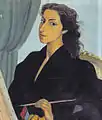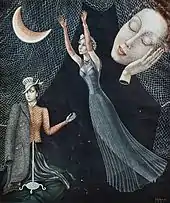Milena Pavlović-Barili | |
|---|---|
 Milena Pavlović-Barili by Carl Van Vechten, 1940 | |
| Born | 5 November 1909 |
| Died | 6 March 1945 (aged 35) New York City, U.S. |
| Nationality | Serbian |
| Known for | Painting |
Milena Pavlović-Barili (alt. Barilli; Serbian Cyrillic: Милена Павловић-Барили; 5 November 1909 – 6 March 1945) was a Serbian painter and poet. She is the most notable female artist of Serbian modernism.[1]
Biography
Her Italian father, Bruno Barilli, was an influential composer.[2] Her Serbian mother, Danica Pavlović-Barili, a descendant of the Karađorđević dynasty, who served as lady in waiting to Queen Maria of Yugoslavia and was tasked with improving her Serbian language. She was also superintendent at the court of King Alexander I of Yugoslavia, who was her second cousin once removed. Danica also had artistic talent and studied art in Munich, where she met her husband Bruno Barilli in 1905, whom she married in an Orthodox ceremony 4 years later in the city of Požarevac.
Milena herself studied at the Royal School of Arts in Belgrade, Serbia (1922–1926) and in Munich (1926–1928). In the early 1930s, she left Serbia and returned only for brief visits until the outbreak of World War II. During her stays in Spain, Rome, Paris and London, where she socialised with Jean Cocteau and André Breton, she was influenced by many western schools and artists, notably Giorgio de Chirico. After 1939, she lived and worked in New York where her career peaked as an illustrator for Vogue,[3] Harper's Bazaar, and other publications under the J. Walter Thompson advertising agency.[4] In 1941, she appeared in the Twentieth Annual of Advertising Art, and before her death, she was commissioned to design costumes for Gian Carlo Menotti's ballet Sebastian and a production of Shakespeare's A Midsummer Night's Dream; these were never completed.[4] She died of a heart attack at the age of 35, having sustained serious injuries in a horse-riding accident the previous summer. She was cremated, according to her American husband's wishes, and buried in a cemetery in Rome.[4] Her envelope-pushing and taboo-breaking work graced galleries all over the world, her ideas sitting at the forefront of the surrealist movement.

The topics of her work varied from portraits to imaginative interpretations of biblical stories. The motifs often included dream-like situations, veils, angels, statues of Venus, and Harlequins. Many of her works are parts of permanent exhibitions in Rome, New York City, Museum of Contemporary Art (Belgrade), and her hometown of Požarevac, where the house in which she was born has been converted into a museum in her honor.[5] In 1943, Pavlović-Barili's work was included in Peggy Guggenheim's show Exhibition by 31 Women at the Art of This Century gallery in New York.[6]
Legacy
She was born in Požarevac, and the house in which she was born is now a museum, Milena Pavlović-Barili Gallery, dedicated to her life.
Gallery
 Self-portrait, 1938
Self-portrait, 1938 Self-portrait, 1939
Self-portrait, 1939 Act with mirror
Act with mirror Hot Pink with Cool Grey, 1940
Hot Pink with Cool Grey, 1940 Front pages of "Vogue" magazine and one of the dresses that Milena created
Front pages of "Vogue" magazine and one of the dresses that Milena created Posthumous casting of Milena's hands
Posthumous casting of Milena's hands
Artworks about Milena and her work
Performance
- Milena ZeVu, ‘Milena’ homage to the Serbian artist Milena Pavlovic Barilli (1909-1945), House of Jevrem Grujic, March 2019, Belgrade, Serbia
See also
References
- ↑ Vukovic, Sofija. "Milena Pavlović Barili" (in Serbo-Croatian). stazenezele. Archived from the original on 24 February 2015. Retrieved 2 January 2016.
- ↑ Dejan Djokić (2023). A Concise History of Serbia. Cambridge University Press. p. 375. ISBN 978-1-107-02838-8.
- ↑ "From Serbia to the World: Fashion Illustrations of Milena Pavlović Barilli". fashionheritage.eu. Retrieved 2021-05-06.
- 1 2 3 Barilli, Milena Pavlović (2010). Milena Pavlovic Barilli: la moda nella stanza di un'artista (in Italian). Edizioni Pendragon. ISBN 978-88-8342-818-0.
- ↑ "Milena Pavlović Barilli, she painted the world". Serbia.com. Retrieved 2 January 2016.
- ↑ Butler, Cornelia H.; Schwartz, Alexandra (2010). Modern Women: Women Artists at The Museum of Modern Art. New York: Museum of Modern Art. p. 45. ISBN 9780870707711.
